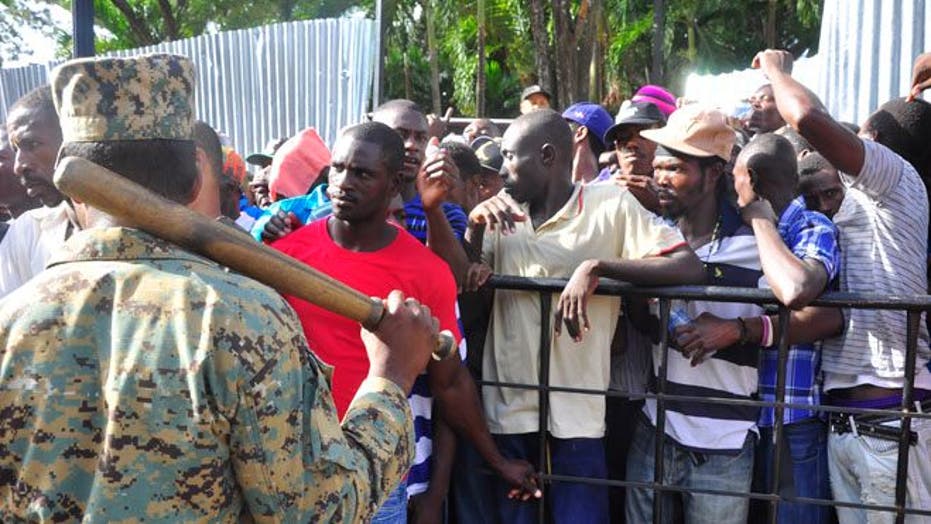Rep. Duncan Hunter, a San Diego, California, based Republican, says that Department of Homeland Security documents he obtained recently show Mexican officials have been helping thousands of Haitian immigrants to travel to the border and cross into the United States.
According to U.S. Customs and Border Protection (CBP), since October 2015 more than 4,336 Haitians have entered the U.S., with 2,600 still stuck at the San Ysidro port of entry in Tijuana, Mexico. Another 3,500 are in route.
Hunter blames the Obama administration for the huge influx of Haitian asylum seekers.
“Obama’s saying, 'Come one, come all,'” he told Fox News Latino. One of the issues the congressman has with the Mexican government's role in the issue is a transit visa the country has been issuing to migrants, allowing them enough time to traverse the country and cross into the U.S.
“I don’t think Mexico is giving them the 20-day transit document for them to stay in Mexico. Haitians know that America is a land of plenty,” Hunter told FNL.
In fiscal year 2015, which ran through the end of last September, 339 Haitians without visas arrived at the San Ysidro border crossing, compared to 6,121 in 2016 — an increase of more than 1,700 percent.
The first stop in the migrants' nearly 10,000-mile trek to the U.S., according to the DHS documents, is Brazil, which opened its doors to Haitians after the 2010 earthquake that devastated their nation and killed 220,000 people.
In their two- to four-month trek, Haitians need to travel across 11 countries by bus, boat, car and even on foot, until landing on the U.S. doorstep in Tijuana.
Just to get there, they pay as much as $2,300 apiece to smugglers – usually in $100 to $300 increments along the way, according to the documents.
It isn't just north of the border that the Haitian immigrants are causing concern.
Juan C. Lopez Lee of the Nationalist Front of Mexico, and extreme right-wing organization, says it’s time for the Mexican officials to put an end to issuing the transit documents, arguing that the country shouldn’t have to take care of the Haitian migrants while they're waiting for asylum or pay to deport them.
“In practice, they’re staying in Mexico,
“Our organization has received reports that the situation is getting out of control,” Lopez Lee told Fox News Latino. "[Haitians] are on the streets and begging for money. Mexico is trying to help them, but eventually it’s going to end. Mexican press has reported there are 700 Haitians arriving at the border per day.”
On the way to Mexico, the DHS documents show, many Haitians assume Congolese identities, “believing authorities will be reluctant to deport them to West Africa.”
Once in Mexico, they are often detained, but then receive a 20-day transit document. When they arrive in Tijuana, they usually go to migrant shelters or a hotel before showing up at the border and presenting themselves to immigration agents.
CBP says agents process each Haitian immigrants on a “case-by-case basis,” and those who don’t have permission to be in the U.S. are sent to Immigration and Customs Enforcement (ICE).
As of Sept. 24, ICE was detaining 619 Haitians.
“The responsibility rests with the Obama administration. They’re allowing people to arrive and stay in the U.S.,” Jessica Vaughan, policy studies director at the Center for Immigration Studies, told FNL.
“There’s widespread knowledge that if they can arrive, they’ll [get to] stay. They wouldn’t fork over the money [to smugglers] and go through the perilous journey if they didn’t believe they could make it and stay. It’s a powerful motivation. Not just for Haitians but Cubans, Central Americans.”
Jeh Johnson, secretary of Homeland Security, said in a statement in September that conditions in Haiti had “improved sufficiently to permit the U.S. government to remove Haitian nationals on a more regular basis.”
Duncan says Johnson and the Obama administration only issued the statement after the wave of migrants to the southwestern border got out of control.
According to the New York Times, federal officials said the asylum law would continue to apply to newly arriving Haitians. Any migrant who reports a threat of persecution or torture upon returning to Haiti could apply for asylum.
“We have the only double border fence in the country. It’s 13 miles from the beach to the mountains. The part of the border that goes through Tijuana is secure,” Hunter said.
“All you have to do is go to border office, claim asylum with 'credible fear' and demand to be taken in," he added. "The fence only matters with drugs and criminals, but in terms of immigration it doesn’t make a difference.”

